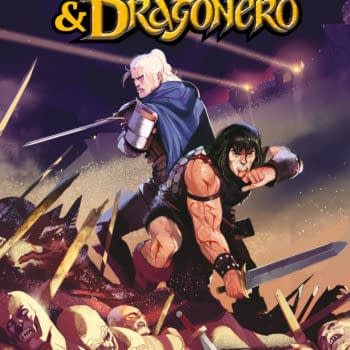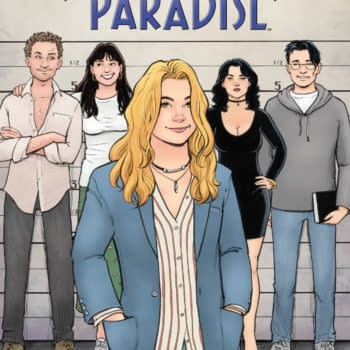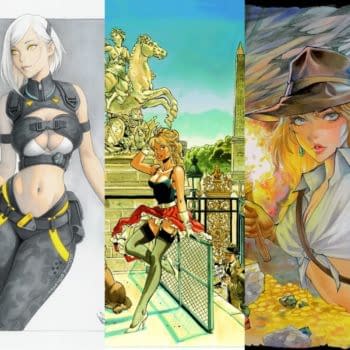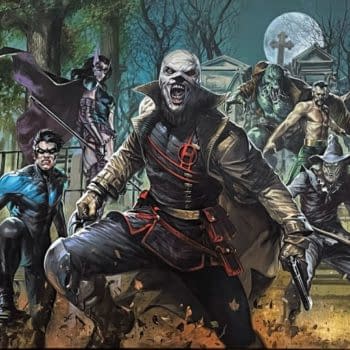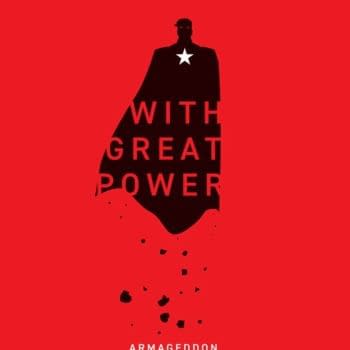Posted in: Comics | Tagged: Americatown, archaia, Bradford Winters, Comics, entertainment, larry cohen
A 'Quick Financial Fix' For Immigrants Goes South In Americatown – Talking With Bradford Winters & Larry Cohen
It's not every day you encounter an intense multi-person drama on the scale of Americatown in the comics medium. It's possible that some comic creators shy away from the difficulties of making a lot of dialogue and often nuanced interpersonal conflict work in enclosed environments, though some have been lauded for their success in doing so. Balancing drama with action is hard work and takes intricate planning, but that's something that well established screen writers Bradford Winters and Larry Cohen are accustomed to. When Americatown, a tale of a family caught up in the strained immigrant trends of fleeing America to find work and send money home, made it to the planning stages at HBO as an original series but didn't proceed further, they took the concept and story back to the drawing board and reframed it for comics.
What you'll find in Americatown is a very character-driven narrative, laced with movement and action that keeps the pace moving briskly, and a story where the role of the visual is appropriately dominant. It's an emotive story and one that pulls you along with plenty of tension and uncertainty for Owen, a father who has made a perilous journey to make money for his family only to find that things are a lot more precarious than he'd ever imagined. I spoke with Bradford Winters and Larry Cohen about their 8 part project with artist Daniel Irizarri.
[Cover art to #1 by Mike Choi]
Hannah Means-Shannon: It's hard to do the concept for this series justice in a short interview, it contains so many ideas that are actually relevant to our modern experience. If you had to pick some genre-related terms to describe Americatown, which do you think fit best? Social sci-fi? Future-set drama? Survival adventure?
Bradford Winters & Larry Cohen: At its heart it's a family drama wrapped up in a dystopian tale of the near future. The comic finds its sweet spot where Robert Frank's iconic mid-twentieth century book of photographs "The Americans" meets Alfonso Cuaron's "Children of Men".
[10th Anniversary cover by Sonny Liew]
HMS: To address the naturally big discussion point about the origin of the series, it was originally conceived of as a show for HBO, where it generated some momentum but didn't come to fruition. Obviously, it was designed to be a story told in a visual medium. Could you share a few things about the comic that are very similar or quite different from what you had planned for the show?
BW & LC: The vision remains what it's been from the get-go. And while the comic medium is a departure from the screen, we are talking about the difference between the moving image and the still — thus, we have found the compatibility factor to be quite high. At the same time, we're doing our best to embrace the particular attributes of comics that let the reader play a more active role in fleshing out the story and world of the series.

BW & LC: In Owen Carpenter, we have tried to fashion an everyman whose particular struggle would be relatable to a wide audience. A devoted husband and father who never imagined himself one day becoming an immigrant struggling to support his family. Owen is a man whose journey to Americatown begins as nothing more than a quick financial fix. Knowing the idea of Americans as immigrants is a challenging one to the national imagination, we wanted to feature a character with the same resistance to the idea of his new identity abroad. The other characters that surround him span the gamut of resisting and embracing that same identity, both as individuals and as members of the Americatown community.

BW & LC: We present a world where technology brings people together in greater virtual proximity than ever before. One might deem that helpful, but when they are truly separated by seven thousand miles of land, sea and family hardship — the illusion of intimacy only emphasizes the chasm of separation that much more.

BW & LC: While the idea did originally posit a down and out America suffering total collapse, we have backed off from that extreme to present a more realistic scenario in which America is still a global player, if not the preeminent one it once was. This version mirrors the present day realities of countries like China and India that also experienced massive waves of emigration in the midst of functioning and in some ways even thriving economies.

BW & LC: Daniel has played a key role in rendering Americatown as a world onto itself. We are deeply grateful to his attention to both the inner life of our characters and the outer design of the enclave.
[Variant cover by Daniel Irizarri for #1]
HMS: Can you tease anything that's coming up in the series for readers? What are some of the struggles Owen is going to encounter?
BW & LC: All we can offer for now is this — How would you celebrate July 4th in winter south of the equator when life and death stakes are in play for your family?
Americatown #1 arrives in shops this week on Wednesday, August 12th!













